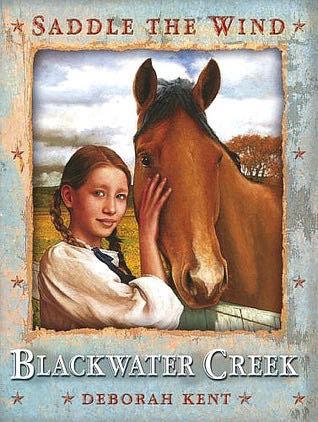Blackwater Creek
Reviewed date: 2009 Mar 11
151 pages
Another day, another horse book. *sigh*
Blackwater Creek stars Erika Nagy, the ten-year-old daughter of a Hungarian immigrant family. The Nagys came to America to buy land and build a new life. Instead, Erika's mother dies of fever and Erika's father bets everything hoping to get rich quick in the California gold rush. While Papa and big brother Sandor pan for gold all day, Erika goes to work for the evil landowner Mr. Hart Latham just to pay the bills.
Fortunately, one of Mr. Latham's horses escapes from the corral. I say fortunately, because when Erika finally finds the lost filly, she's led Erika straight to Blackwater Creek: a remote stream fairly flowing with gold! Of all the serendipitous events! *sigh* Such plotlines are typical of juveniles. It's a shame. Anyway, Erika picks up some nuggets and convinces her father to go stake a claim at Blackwater Creek. Mr. Nagy does, and the Nagys get rich.
There is a showdown with Mr. Latham, who suspects that Blackwater Creek is on his land (it isn't) and tries to steal the Nagys' claim. Serendipitously, the authorities show up and catch Latham in the act of pulling out the Nagys' stakes. Even more serendipitously, it turns out Mr. Latham is behind on his mortgage--all his workers left to pan for gold and so his ranch is losing money. The bank is going to foreclose!
Oh, and the horse. Erika buys the golden filly, named Arany (Hungarian for gold), from Mr. Latham. It's a happy ending.
The book plays up the immigrant experience. The Nagys experience discrimination because they're foreigners. The discrimination never extends beyond being name-calling, as far as I can tell. Only Mr. Latham actually threatens them, and that's because he's evil, not because he's xenophobic. Erika does get caught up in a lynch mob that hangs a Frenchman for trumped up charges of claimjumping, and that hammers home the message that Americans hate other people.
Blackwater Creek is a decent book that introduces kids to the California gold rush, and it teaches them not to fear foreigners. That's a good history lesson and a good moral, so it's a good book. There's nothing compelling about it, though.
